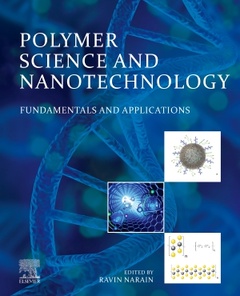Description
Polymer Science and Nanotechnology
Fundamentals and Applications
Coordinator: Narain Ravin
Language: English
Subjects for Polymer Science and Nanotechnology:
Keywords
Additive manufacturing; AFM; Alginate; Applications; Bandgap; Bernoullian distribution; Biocompatibility; Biodegradation; Biomaterials; Biopolymers; Bottom-down method; Byproducts; Calendering; Characterization; Chemical modification; Classification of polymers; Coating; Conductive polymers; Copolymerization; Copolymers; Crystallinity; Degree of polymerization; Differential scanning calorimetry; DLS; DNA; DOSY; Drug delivery; Dynamic mechanical analysis; EDL; Electronics; Energy; Enzymatic reactor; Extrusion; Food packaging; Functional hydrogels; Gas separation; GPC; Homopolymerize; Hydrogels; Hydrolysis; Implants; Industry; Intermolecular forces; Laser-induced; Magnetic characterization; Medicine; Microneedles; Mixing; Molding; Molecular structures; Monomer; Nanocables; Nanodimensions; Nanofibers; Nanoindentation; Nanomaterials; Nanometer-scale; Nanoparticle synthesis; Nanotechnology; Natural polymers; NMR; Optical measurements; Osmometry; PEGylation; Photolysis; Photo-oxidative degradation; Physical modification; Physicochemical characterization; Polyethylene; Polyhydroxyalkonate; Polymer; Polymer melting; Polymer properties; Polymer science; Polymeric materials; Polymerization; Polymers; Polymersome; Polynucleotide; Polysaccharide; Polystyrene; Product; Proteins; Radiation-induced; Reactants; Reactivity ratio; Role of surfactant; SAM; Self-assembly; Self-healing hydrogels; SEM; Size control; SLS; Smart polymers; Stabilization; Stimuli-responsive polymers; Stress-strain curve; Surface effects; Synthesis; Synthetic polymers; TEM; Temperature-responsive polymers; Thermal analysis; Thermal degradation; Thermogravimetric analysis; Thermo-oxidative degradation; Top-down approach; Tough hydrogels; Vaccine; Viscoelastic behavior; Viscosity; Water purification; XPS; XRD; Zeta potential
488 p. · 19x23.3 cm · Paperback
Description
/li>Contents
/li>Readership
/li>Biography
/li>Comment
/li>
Polymer Science and Nanotechnology: Fundamentals and Applications brings together the latest advances in polymer science and nanoscience. Sections explain the fundamentals of polymer science, including key aspects and methods in terms of molecular structure, synthesis, characterization, microstructure, phase structure and processing and properties before discussing the materials of particular interest and utility for novel applications, such as hydrogels, natural polymers, smart polymers and polymeric biomaterials. The second part of the book examines essential techniques in nanotechnology, with an emphasis on the utilization of advanced polymeric materials in the context of nanoscience.
Throughout the book, chapters are prepared so that materials and products can be geared towards specific applications. Two chapters cover, in detail, major application areas, including fuel and solar cells, tissue engineering, drug and gene delivery, membranes, water treatment and oil recovery.
Section I 1. Brief overview of polymer science 2. Nature and molecular structure of polymers 3. Polymer synthesis 4. Copolymerization 5. Modification of polymers 6. Polymer characterization 7. Polymer degradation and stability 8. Polymer processing and rheology 9. Thermal, mechanical, and electrical properties 10. Hydrogels 11. Biopolymers and natural polymers 12. Smart Polymers 13. Polymers in medicine 14. Polymers for advanced applications
Section II 15. Nanomaterials properties 16. Nanomaterial synthesis 17. Nanomaterials characterization 18. Nanomaterials applications
His research has also covered biomaterials, nanomedicine, and regenerative medicine, with an emphasis on developing advanced materials as nucleic acid and cancer therapeutics, antifouling and antimicrobial uses, and cell/tissue engineering advances. He has published over 180 articles in peer-reviewed and high-impact journals and has edited several books.
- Presents the latest applications of polymers and polymeric nanomaterials, across energy, biomedical, pharmaceutical, and environmental fields
- Contains detailed coverage of polymer nanocomposites, polymer nanoparticles, and hybrid polymer-metallic nanoparticles
- Supports an interdisciplinary approach, enabling readers from different disciplines to understand polymer science and nanotechnology and the interface between them




